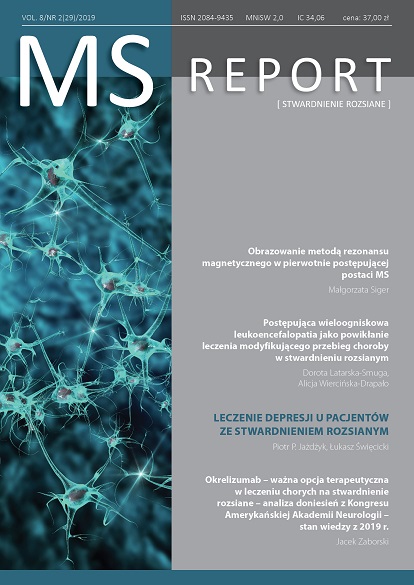Leczenie depresji u pacjentów ze stwardnieniem rozsianym Artykuł przeglądowy
##plugins.themes.bootstrap3.article.main##
Abstrakt
U pacjentów ze stwardnieniem rozsianym depresja występuje istotnie częściej niż w populacji ogólnej. Co więcej, u części z nich nie jest ona prawidłowo rozpoznawana, a co za tym idzie – pacjenci nie otrzymują prawidłowego leczenia. Jednym z istotnych problemów jest fakt, że wiele objawów depresji może zostać uznanych, ze względu na kliniczne podobieństwo, za objawy stwardnienia rozsianego (możliwa jest także odwrotna pomyłka), co zdecydowanie utrudnia diagnostykę i leczenie depresji w tej grupie pacjentów, stanowiąc istotny problem w codziennej praktyce klinicznej. Niniejszy artykuł podsumowuje aktualnie dostępną wiedzę dotyczącą patogenezy, diagnostyki oraz – w szczególności – leczenia depresji u pacjentów ze stwardnieniem rozsianym.
##plugins.themes.bootstrap3.article.details##
Copyright © by Medical Education. All rights reserved.
Bibliografia
2. Pandya R, Metz L, Patten SB. Predictive value of the CES-D in detecting depression among candidates for disease-modifying multiple sclerosis treatment. Psychosomatics 2005; 46: 131-134.
3. Minden SL, Feinstein A, Kalb RC et al. Evidence-based guideline: assessment and management of psychiatric disorders in individuals with MS: report of the Guideline Development Subcommittee of the American Academy of Neurology. Neurology 2014; 82: 174-181.
4. The Goldman Consensus statement on depression in multiple sclerosis. Mult Scler 2005; 11: 328-337.
5. Feinstein A, Pavisian B. Multiple sclerosis and suicide. Mult Scler 2017; 23: 923-927.
6. Goksel Karatepe A, Kaya T, Gunaydn R et al. Quality of life in patients with multiple sclerosis: the impact of depression, fatigue, and disability. Int J Rehabil Res 2011; 34: 290-298.
7. Mohr DC, Goodkin DE, Likosky W et al. Treatment of depression improves adherence to interferon beta-1b therapy for multiple sclerosis. Arch Neurol 1997; 54: 531-533.
8. Mohr DC, Boudewyn AC, Goodkin DE et al. Comparative outcomes for individual cognitive-behavior therapy, supportive-expressive group psychotherapy, and sertraline for the treatment of depression in multiple sclerosis. J Consult Clin Psychol 2001; 69: 942-949.
9. Kahl KG, Kruse N, Faller H et al. Expression of tumor necrosis factor-alpha and interferon-gamma mRNA in blood cells correlates with depression scores during an acute attack in patients with multiple sclerosis. Psychoneuroendocrinology 2002; 27: 671-681.
10. Fassbender K, Schmidt R, Mossner R et al. Mood disorders and dysfunction of the hypothalamic-pituitary-adrenal axis in multiple sclerosis: association with cerebral inflammation. Arch Neurol 1998; 55: 66-72.
11. Feinstein A, Magalhaes S, Richard JF et al. The link between multiple sclerosis and depression. Nat Rev Neurol 2014; 10: 507-517.
12. Lana-Peixoto MA, Teixeira AL Jr., Haase VG. Interferon beta-1a-induced depression and suicidal ideation in multiple sclerosis. Arq Neuropsiquiatr 2002; 60: 721-724.
13. Zephir H, De Seze J, Stojkovic T et al. Multiple sclerosis and depression: influence of interferon beta therapy. Mult Scler 2003; 9: 284-288.
14. Association AP. Diagnostic and statistical manual of mental disorders (5th ed), 2013.
15. Honarmand K, Feinstein A. Validation of the Hospital Anxiety and Depression Scale for use with multiple sclerosis patients. Mult Scler 2009; 15: 1518-1524.
16. Benedict RH, Fishman I, McClellan MM et al. Validity of the Beck Depression Inventory-Fast Screen in multiple sclerosis. Mult Scler 2003; 9: 393-396.
17. Schiffer RB, Wineman NM. Antidepressant pharmacotherapy of depression associated with multiple sclerosis. Am J Psychiatry 1990; 147: 1493-1497.
18. Ehde DM, Kraft GH, Chwastiak L et al. Efficacy of paroxetine in treating major depressive disorder in persons with multiple sclerosis. Gen Hosp Psychiatry 2008; 30: 40-48.
19. Scott TF, Nussbaum P, McConnell H, Brill P. Measurement of treatment response to sertraline in depressed multiple sclerosis patients using the Carroll scale. Neurol Res 1995; 17: 421-422.
20. Barak Y, Ur E, Achiron A. Moclobemide treatment in multiple sclerosis patients with comorbid depression: an open-label safety trial. J Neuropsychiatry Clin Neurosci 1999; 11: 271-273.
21. Solaro C, Bergamaschi R, Rezzani C et al. Duloxetine is effective in treating depression in multiple sclerosis patients: an open-label multicenter study. Clin Neuropharmacol 2013; 36: 114-116.
22. Shafey H. The effect of fluoxetine in depression associated with multiple sclerosis. Can J Psychiatry 1992; 37: 147-148.
23. Thomas PW, Thomas S, Hillier C et al. Psychological interventions for multiple sclerosis. Cochrane Database Syst Rev 2006: Cd004431.
24. Mohr DC, Likosky W, Bertagnolli A et al. Telephone-administered cognitive-behavioral therapy for the treatment of depressive symptoms in multiple sclerosis. J Consult Clin Psychol 2000; 68: 356-361.
25. Grossman P, Kappos L, Gensicke H et al. MS quality of life, depression, and fatigue improve after mindfulness training: a randomized trial. Neurology 2010; 75: 1141-1149.
26. Burschka JM, Keune PM, Oy UH et al. Mindfulness-based interventions in multiple sclerosis: beneficial effects of Tai Chi on balance, coordination, fatigue and depression. BMC Neurol 2014; 14: 165.
27. Dalgas U, Stenager E, Sloth M, Stenager E. The effect of exercise on depressive symptoms in multiple sclerosis based on a meta-analysis and critical review of the literature. Eur J Neurol 2015; 22: 443-e34.
28. Ensari I, Motl RW, Pilutti LA. Exercise training improves depressive symptoms in people with multiple sclerosis: results of a meta-analysis. J Psychosom Res 2014; 76: 465-471.
29. Fregni F, Pascual-Leone A. Transcranial magnetic stimulation for the treatment of depression in neurologic disorders. Curr Psychiatry Rep 2005; 7: 381-390.
30. Rasmussen KG, Keegan BM. Electroconvulsive therapy in patients with multiple sclerosis. J ECT 2007; 23: 179-180.
31. Steen K, Narang P, Lippmann S. Electroconvulsive Therapy in Multiple Sclerosis. Innov Clin Neurosci 2015; 12: 28-30.

